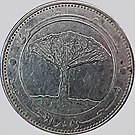Yemeni rial
| ريال يمني (Arabic) | |
|---|---|
 1000 Yemeni rial banknote | |
| ISO 4217 | |
| Code | YER (numeric: 886) |
| Subunit | 0.01 |
| Unit | |
| Symbol | ﷼ or YRl/YRls |
| Denominations | |
| Superunit | |
| 10 | dinar |
| Subunit | |
| 1⁄100 | fils |
| Banknotes | YRls 50, YRls 100, YRls 200, YRls 250, YRls 500, YRls 1,000 |
| Coins | YRl 1, YRls 5, YRls 10, YRls 20 |
| Demographics | |
| Replaced | North Yemeni rial Yemeni dinar |
| User(s) | |
| Issuance | |
| Central bank | Central Bank of Yemen |
| Website | www |
| Valuation | |
| Inflation | 16.8% |
| Source | 2023[1] |
The rial (Arabic: ريال يمني; sign: ﷼; abbreviation: YRl (singular) and YRls (plural) in Latin,[2] ,ر.ي in Arabic; ISO code: YER) is the official currency of the Republic of Yemen. It is technically divided into 100 fils, although coins denominated in fils have not been issued since Yemeni unification. Due to the ongoing political instability, the value of the Yemeni rial has fallen significantly.
The Yemeni civil war has caused the currency to diverge. In southern Yemen, which is primarily controlled by UAE-backed separatists and the former government backed by Saudi Arabia, ongoing printing has caused the currency's value to plummet. However, in northern Yemen, which is primarily controlled by Ansar Allah with support from Iran, banknotes printed after 2017 are not considered legal tender. Therefore, the exchange rate has remained stable.[3] The differences in banknotes printed before and after 2017 can be determined by its size.
History
[edit]In the 18th and 19th century, the rial was traditionally associated with the Maria Theresa thaler, a currency that was widely used in Yemen owing to the Mocha coffee trade with the French, and a Yemeni request that its produce be paid for in thalers.[4]
As Yemen progressed, it developed its own legal currency. After the union between the North (the Yemen Arab Republic) and the South (the People's Democratic Republic of Yemen) in 1990, both the northern rial and the southern dinar remained legal tender during a transitional period, with an exchange rate set at 1 dinar to 26 rials. On 11 June 1996, the dinar was withdrawn from circulation. In 1993, the first coins were issued for the Republic of Yemen. The value of the Yemeni rial against the United States dollar dropped significantly, compared to 12.01 rials per dollar in the early 1990s.
Since the mid-1990s, the Yemeni rial has been freely convertible. Though it dropped from YRls 20 to approximately YRls 215 against the US dollar since then, the rial was stable for several years. However, since 2010 the Central Bank of Yemen has had to intervene many times to protect the currency's value, resulting in a serious decline of foreign reserves.[5] Due to the war, the exchange rate for the Yemeni rial has hovered between 250 and 500 Yemeni rials for 1 US dollar.
Coins
[edit]Before unification, North Yemen issued coins in denominations of 1, 5, 10, 25 and 50 fils, and 1 rial. The fils denominations have all disappeared from circulation. In 1993, new coins were introduced by the Central Bank of Yemen in denominations of 1 and 5 rials. These were followed by 10-rial coins in 1995 and 20-rial coins in 2004.
For the first time in nearly a decade, Yemen's Houthi-led de facto government has announced the issuing of a newly minted 100 riyal coin, a move which has prompted outcry from the internationally recognised government and its central bank based in Aden as a “dangerous escalation.”[6]
| YRl 1 | YRls 5 | YRls 10 | YRls 20 |
|---|---|---|---|
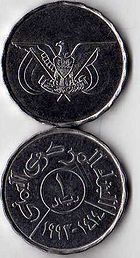
|
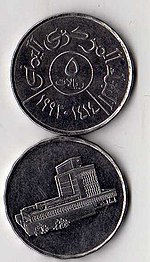
|
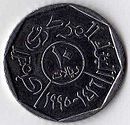
|

|
Banknotes
[edit]At the time of unification, the Central Bank of Yemen issued banknotes in denominations of 1, 5, 10, 20, 50, and 100 rials. In 1993, the 1 and 5 rial notes were replaced by coins, with the same happening to the 10 rial notes in 1995, and 20 rial notes in 2004. In 1996, 200 rial notes were introduced, followed by 500 rials in 1997 and 1,000 rials in 1998. A 250 rial banknote was issued in 2009.[7][8]
In 2017, the Central Bank of Yemen, now relocated in Aden, its interim capital due to the civil war, issued 500 and 1,000 rial banknotes with revised security features and different dimensions. In 2018, the Central Bank of Yemen reintroduced the 200 rial banknote and has issued a new 100 rial banknote.
1990-2009 series
[edit]| Image | Value | Main Colour | Description | Date of | |||
|---|---|---|---|---|---|---|---|
| Obverse | Reverse | Obverse | Reverse | Printing | Issue | ||
 |
 |
YRls 1 | Green | Al-Bakiriyya Mosque | Coffea arabica | 1990 | |

|

|
YRls 5 | Light red | Buildings in Old Sana'a | Al-Qahira Castle in Taiz | ||
 |
 |
YRls 10 | Blue and black | Al-Bakiriyya Mosque | Marib Dam | 1992 | |
 |
 |
YRls 20 | Dark brown | Sculpture of Dionysus with grapes | A dhow in Aden Harbor | 1995 | |
 |
 |
YRls 50 | Olive-green | Bronze statue of Ma'adkarib, ancient king of Haram | Shibam city, Hadramaut | 1993 | |
 |
 |
YRls 100 | Purple | Cisterns of Tawila, Aden | City view of Sana'a with mosque minaret and mountains | 1993 | |
 |
 |
YRls 200 | Green | Alabaster sculpture | Mukalla | 1996 | |
 |
 |
YRls 250 | Orange & blue | Al-Saleh mosque, Sana'a | Khor Al-Mukalla | 2009 | November 14, 2009 |
 |
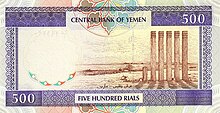 |
YRIs 500 | Purple | Central Bank building, Sana'a | Throne of Queen Bilqis in Ma'rib | 1997 | |
 |
 |
YRls 500 | Blue | Dar al-Hajr (Palace of the Rock) | Al-Muhdhar Mosque, Tarim | 2001 | |
 |
 |
YRls 500 | Cyan | Dar al-Hajr (Palace of the Rock) | Al-Muhdhar Mosque, Tarim | 2007 | |

|

|
YRls 1,000 | Green & yellow | Seiyun Palace, Hadhramaut | Bab al-Yaman, San'a | 1998
2004 |
August 2010 |
2017–2018 series
[edit]| Image | Value | Main Colour | Description | Date of | |||
|---|---|---|---|---|---|---|---|
| Obverse | Reverse | Obverse | Reverse | Printing | Issue | ||
 |
 |
YRls 100 | Red and violet | Dragon Blood Tree of Socotra. Qamariya stained glass window art. Outline of a mosque as a latent image. | Terraced agricultural farming fields. Queen Arwa Mosque Mihrab decorated niche | 2018 | |
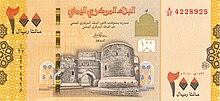 |
 |
YRls 200 | Yellow | Zabid fortress, Al Hudaydah Governorate | Hawf, Al Mahrah Governorate | 2018 | August 2018 |
 |
 |
YRls 500 | Light Cyan | Al-Muhdhar Mosque, Tarim | Dar al-Hajar | 2017 | |
 |

|
YRls 1,000 | Green | Seiyun Palace, Hadhramaut | Bab al-Yaman, San'a | 2017 | |
| Current YER exchange rates | |
|---|---|
| From Google Finance: | AUD CAD CHF CNY EUR GBP HKD JPY USD |
| From Yahoo! Finance: | AUD CAD CHF CNY EUR GBP HKD JPY USD |
| From XE.com: | AUD CAD CHF CNY EUR GBP HKD JPY USD |
| From OANDA: | AUD CAD CHF CNY EUR GBP HKD JPY USD |
| Preceded by: South Yemeni dinar Location: South Yemen Ratio: 1 dinar = 26 rials Note: Use of the Yemeni rial started in 1990, Yemeni dinar was withdrawn from circulation in 1996. |
Currency of Yemen 1990 – |
Succeeded by: Current |
| Preceded by: North Yemeni rial Location: North Yemen Ratio: at par |
See also
[edit]References
[edit]- ^ "Republic of Yemen". International Monetary Fund. Retrieved 26 May 2023.
- ^ "World Bank Editorial Style Guide 2020 - page 139" (PDF). openknowledge.worldbank.org. Retrieved 2022-09-06.
- ^ "Yemen currency clash deepens crisis in war-torn country". www.aljazeera.com. Retrieved 2022-03-08.
- ^ Ghalib bin Awadh al-Qu'aiti, The Maria Theresa Thaler in Hadhramaut: Some Reflections, The British-Yemeni Society
- ^ Ghalib bin Awadh al-Qu'aiti, The Maria Theresa Thaler in Hadhramaut: Some Reflections, pub. by: The British-Yemeni Society
- ^ "New Houthi-issued 100 riyal coin deepens economic divide in Yemen". Middle East Monitor. 1 April 2024.
- ^ Yemen new 250‑rial note confirmed, BanknoteNews.com. Retrieved 2011-09-06.
- ^ BanknoteNews.com Retrieved 2011-09-06.
Sources
[edit]- Krause, Chester L.; Clifford Mishler (1991). Standard Catalog of World Coins: 1801–1991 (18th ed.). Krause Publications. ISBN 0873411501.
- Pick, Albert (1994). Bruce, Colin R. II; Shafer, Neil (eds.). Standard Catalog of World Paper Money: General Issues (7th ed.). Krause Publications. ISBN 0-87341-207-9.


